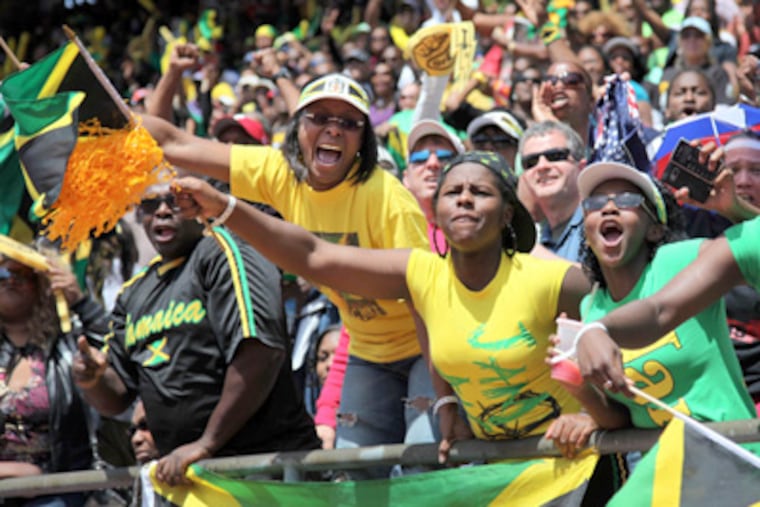Penn Relays are an illegal route to the U.S. for some Jamaican runners
Signs of Jamaica abound at the Penn Relays, the 116-year-old track-and-field festival held each April in Philadelphia. Food carts sizzle with jerk chicken. Fans sporting the green, yellow, and black of the Caribbean nation's flag sit together at the University of Pennsylvania's Franklin Field, and roar.

Signs of Jamaica abound at the Penn Relays, the 116-year-old track-and-field festival held each April in Philadelphia.
Food carts sizzle with jerk chicken. Fans sporting the green, yellow, and black of the Caribbean nation's flag sit together at the University of Pennsylvania's Franklin Field, and roar.
Each year about 40 teams are drawn from more than two dozen Jamaican high schools, with an additional four to six club teams composed of older runners.
Now, however, it seems that some Jamaicans who applied for visas to compete in the Relays in years past were "mala fide applicants . . . disguising themselves as student athletes" in order to immigrate illegally, according to a 2008 cable to the State Department from the U.S. Embassy in Jamaica's capital, Kingston. The cable was unearthed by WikiLeaks in late May and later flagged in the Philadelphia blog Phawker.com.
"We haven't found a lot of fraud with Penn Relays, per se," David Stone, consul general in Kingston, told The Inquirer Friday. "But there are always desperate people who want to piggyback" on the Relays to get to the United States. "That's an issue, and our officers [who interview visa applicants] are fully aware of it."
The unclassified cable, sent from the embassy's fraud-prevention unit to State Department headquarters in Washington on May 14, 2008, said the Relays were "a significant cultural milestone for many young Jamaican athletes," and outlined a new screening process designed "to combat the high fraud associated with this event, but still allow the bona fide student athletes to travel."
Stone, who took up his post in Jamaica in September 2009, said he could not comment on the cable directly. He did say that the embassy issues "well over 300" Relays-related visas annually and that a "small" but unspecified number had been abused when the holders failed to return to Jamaica within the required time, which for a single-entry tourist visa is usually six months.
To address the problem, according to the 2008 cable, the embassy's fraud unit gave seminars on the new screening system to more than 100 high school principals and coaches. The procedure appears to require "prescreening" of passports and documents ahead of brief, one-on-one interviews with applicants.
But even with safeguards in place, "it is possible that a club team could pull the wool over our eyes, and we would have no way of knowing about it," said David Johnson, Penn Relays director since 1995.
Created at Penn in 1895, the Relays originally centered on scholastic athletes from Boston, New York, and Philadelphia. The event went international in 1914, with the arrival of an English team. Jamaica joined the party in 1964. Its runners, including Usain Bolt, the world's fastest man, who ran here in 2010, have been a dominating draw.
About 16,000 runners and 2,000 field-event participants invade Franklin Field for the competition, which pulls in more than 100,000 spectators over three days. One race is run about every five minutes during 33 hours of competition. A highlight is "America vs. the World," which features 4-by-100-meter, 4-by-400-meter, and distance-medley relays.
Johnson said he was "not entirely surprised," given post-9/11 security consciousness, when a State Department official called about three years ago "and kept asking about our means of verification of athletes."
Johnson told him that he verified their names, dates of birth, and running eligibility, but had no reason to inquire about their passport and immigration status because he did not grant visas, the U.S. government did.
While most of the Jamaican runners are high school athletes whose headmasters sign off on their eligibility, said Johnson, there also are club teams of older athletes who are out of college or never attended.
The Jamaicans are talented runners who train in ideal weather and hit the peak of their racing cycle each year just in time of the Relays.
The lure of America and "desire to make enough of a name to get a scholarship here," Johnson said, "are enormous motivators."
Getting an education here, he said, "can change the life of your whole family."
In all his years organizing the Relays, Johnson said, almost nothing surprises him now.
One year a California film company called him to ask for media passes for access to the stadium. It turned out to be a Girls Gone Wild-type outfit and was rejected.
Another year, a high-profile rap artist, whose name Johnson said he could not recall, wanted to come with "a small retinue, including armed bodyguards." When Johnson explained that weapons were prohibited in the stadium, the rapper changed his mind.
So a call out of the blue from officials asking about visa fraud?
"I would not have imagined it. I hadn't thought of it," said Johnson, "But I'm not all that surprised. . . . There have been so many bizarre requests over the years."